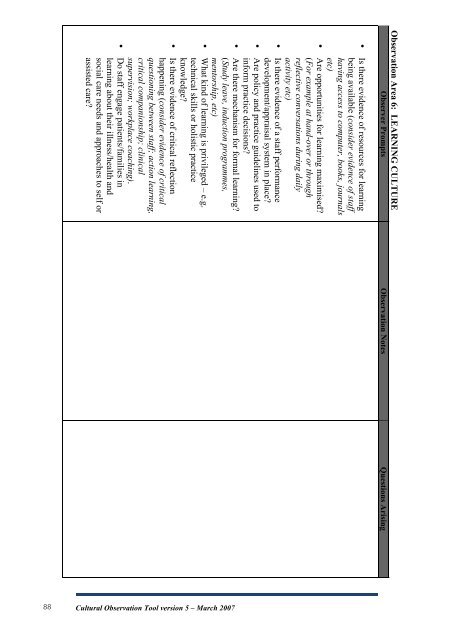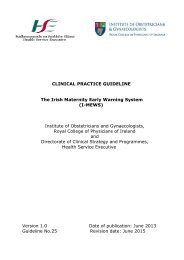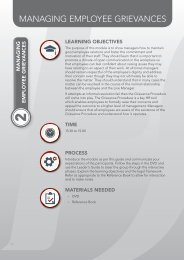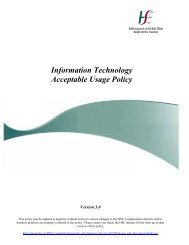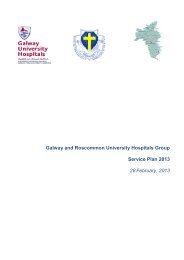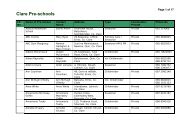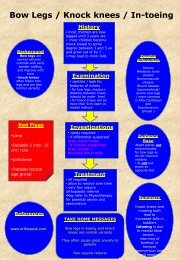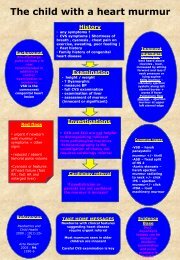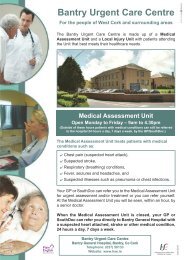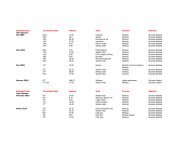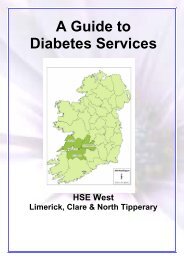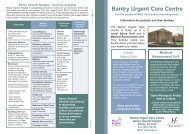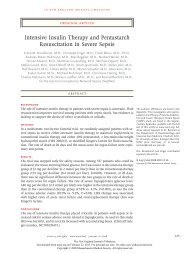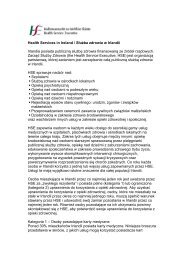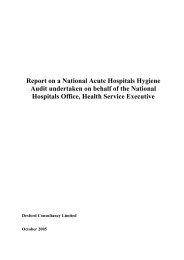Enhancing Care for Older People - Health Service Executive
Enhancing Care for Older People - Health Service Executive
Enhancing Care for Older People - Health Service Executive
You also want an ePaper? Increase the reach of your titles
YUMPU automatically turns print PDFs into web optimized ePapers that Google loves.
Cultural Observation Tool – version 4 17<br />
88<br />
• Are opportunities <strong>for</strong> learning maximised?<br />
(For example at hand-over or through<br />
reflective conversations during daily<br />
activity etc)<br />
• Is there evidence of a staff per<strong>for</strong>mance<br />
development/appraisal system in place?<br />
• Are policy and practice guidelines used to<br />
in<strong>for</strong>m practice decisions?<br />
• Are there mechanism <strong>for</strong> <strong>for</strong>mal learning?<br />
(Study leave, induction programmes,<br />
mentorship, etc)<br />
• What kind of learning is privileged – e.g.<br />
technical skills or holistic practice<br />
knowledge?<br />
• Is there evidence of critical reflection<br />
happening (consider evidence of critical<br />
questioning between staff; action learning,<br />
critical companionship; clinical<br />
supervision; workplace coaching).<br />
• Do staff engage patients/families in<br />
learning about their illness/health and<br />
social care needs and approaches to self or<br />
assisted care?<br />
Workplace<br />
Culture<br />
Critical<br />
Analysis<br />
Tool<br />
ORIGINAL AUTHORS OF THE WCCAT<br />
o Brendan McCormack, Professor of Nursing Research University of Ulster and<br />
Director of Nursing Research and Practice development, Royal Hospitals Trust,<br />
Belfast.<br />
o Elizabeth Henderson, Lead Cancer Nurse, Northern Ireland Cancer Network.<br />
o Dr Val Wilson, Director of Nursing Research & Practice Development, the Children's<br />
Hospital at Westmead, NSW, Australia.<br />
o Jayne Wright, Research Associate, University of Ulster<br />
April 2007<br />
having access to computer, books, journals<br />
etc)<br />
• Is there evidence of resources <strong>for</strong> learning<br />
being available (consider evidence of staff<br />
Observation Area 6: LEARNING CULTURE<br />
Observer Prompts Observation Notes Questions Arising<br />
The WCCAT has been developed to help people involved in the<br />
development of practice to undertake observational studies of work<br />
place settings in order to in<strong>for</strong>m changes in practice. The tool is<br />
suitable <strong>for</strong> use by anyone who has some experience of practice<br />
development including the observation of practice. The tool has<br />
been developed from an analysis of our experience of leading and<br />
facilitating practice development programmes over many years.<br />
Observation is one of the key tools used in emancipatory<br />
practice development – a <strong>for</strong>m of practice development that is<br />
concerned with changing the culture and context of practice in order<br />
to develop sustainable person-centred and evidence-based<br />
workplaces. Seeing practice, raising consciousness about taken <strong>for</strong><br />
granted practices and reflecting on taken <strong>for</strong> granted assumptions<br />
are key components of comprehensive observation. This tool is<br />
designed to help you develop a systematic approach to undertaking<br />
these activities.<br />
We encourage you to use this tool and would welcome<br />
your feedback on its relevance and usability in your practice<br />
development work.<br />
Contact<br />
Brendan McCormack: bg.mccormack@ulster.ac.uk<br />
Liz Henderson liz.henderson@bch.n-i.nhs.uk<br />
<strong>for</strong> further in<strong>for</strong>mation.<br />
Cultural Observation Tool version 5 – March 2007 1<br />
88


